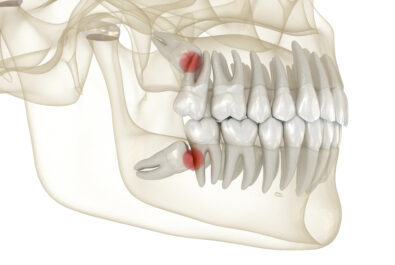Believe it or not, there are more wisdom teeth that are removed than left in the mouth. There are many reasons behind this – but, it ultimately comes down to the damage they could cause to your oral health. Most people have at least one wisdom tooth (or third molar) – although, there are rare cases where some people don’t have any. While they can be an asset to your mouth, they aren’t actually as necessary anymore. The foods we chew are much softer than the coarse food our ancestors had to eat – but now, our jaws have since decreased in size and don’t always allow enough space for these teeth to properly come in.
When Wisdom Teeth Endanger Your Oral Health
Your dentist begins taking x-ray images of your mouth when you’re a child allowing them to see your third molars well before they erupt (in your late teens or early twenties). As they monitor their growth over your adolescent years, they can begin to determine whether your wisdom teeth will cause complications or they’ll come in perfectly aligned. In many situations, they can extract your molars before they cause you discomfort – although, that’s not always the case. But, on the other hand, just because you’re not feeling any pain around your wisdom teeth, doesn’t mean there isn’t a problem. Often times, third molars come in misaligned, damage surrounding teeth, or become impacted (stuck between your jawbone and gum tissue) and pose a huge risk for an oral infection.
Visiting Your Dentist
If you’re experiencing any pain near your wisdom teeth (or where they would come in), give your dentist a call. Depending on the circumstances, they may want you to come in so they can have a look at your third molars. If these teeth coming in are causing other complications around your mouth – like crowding, misalignment, or infections – they’ll need to be extracted. But, keep in mind that every patient is different, only your dentist will be able to make this determination depending on your individual situation.














